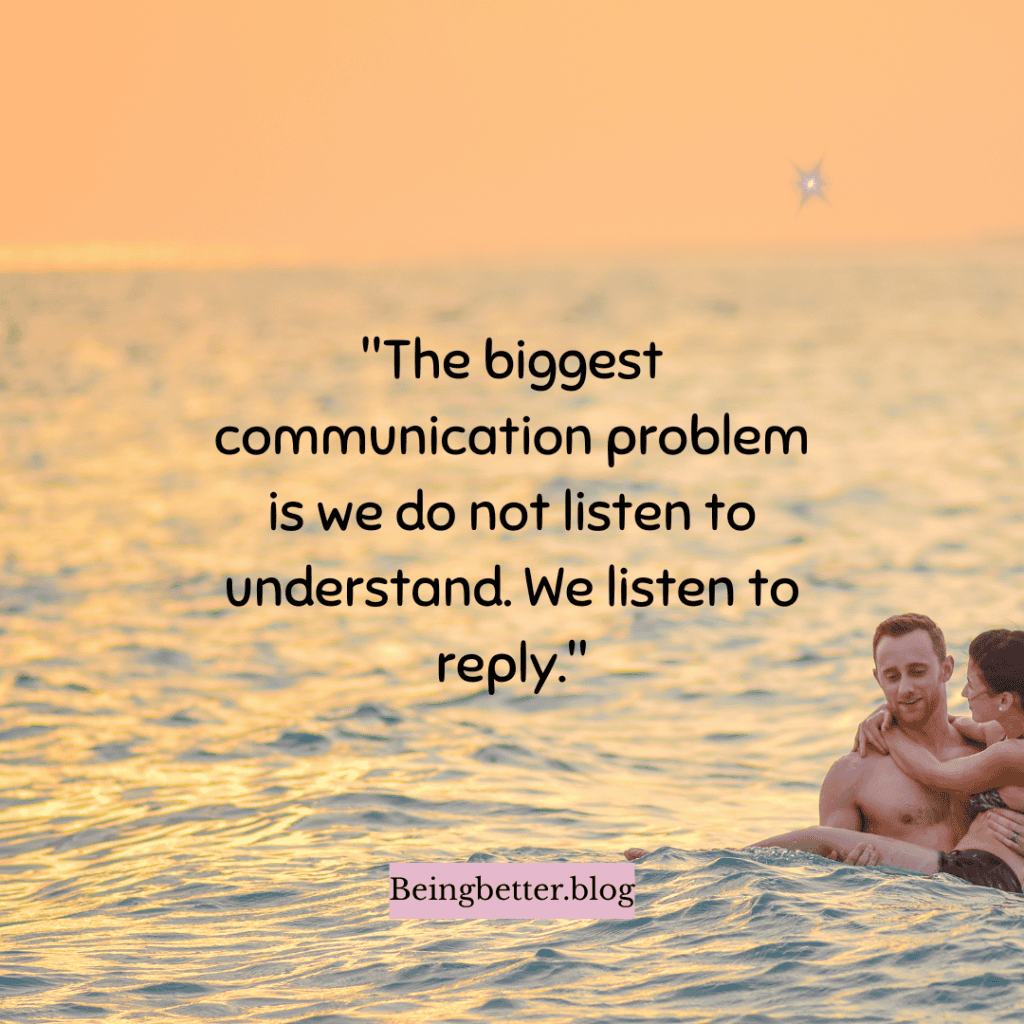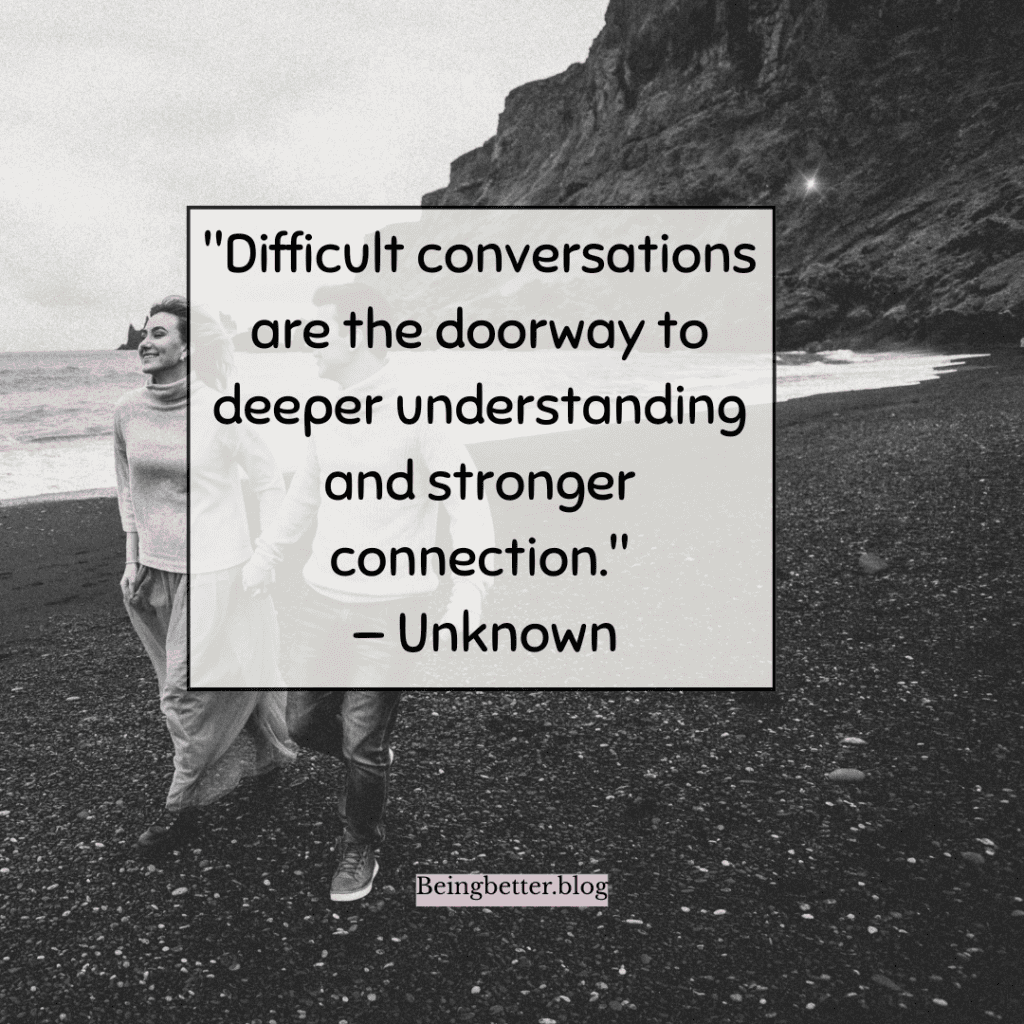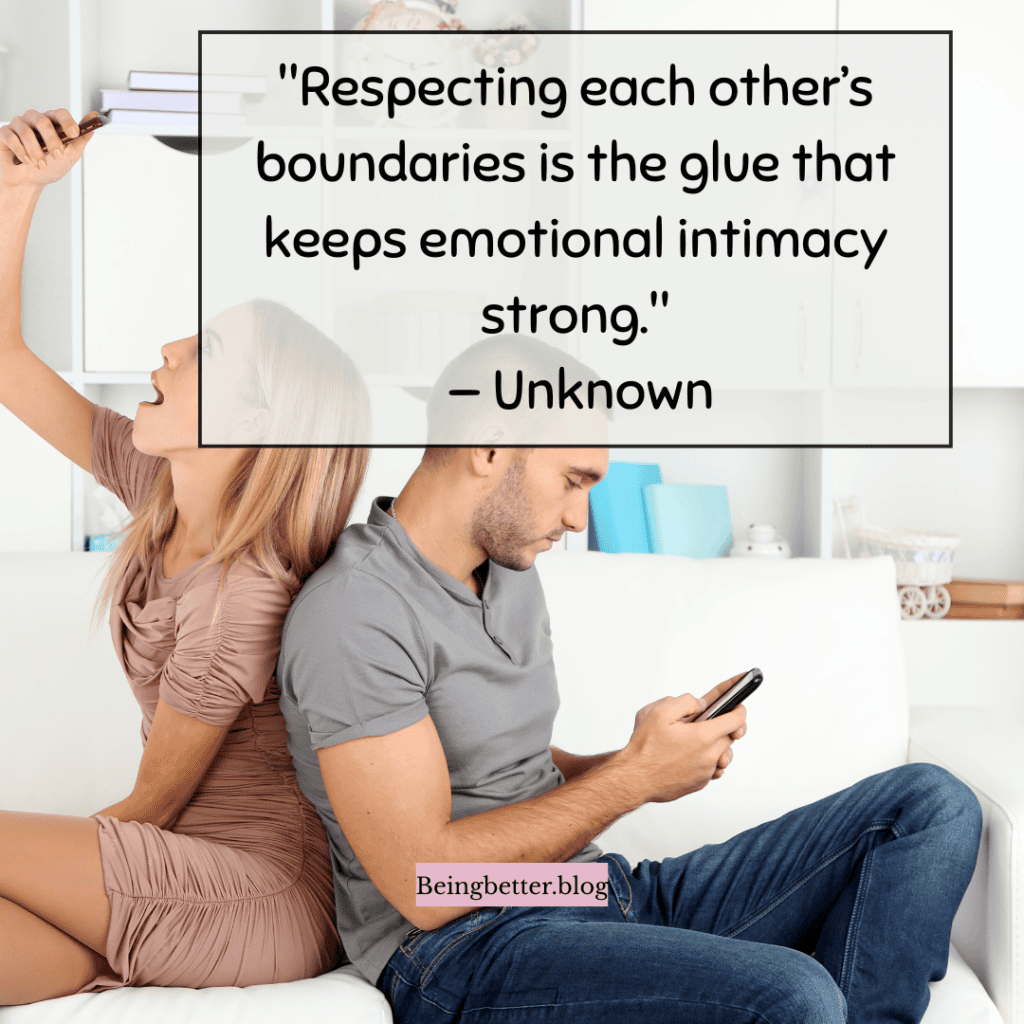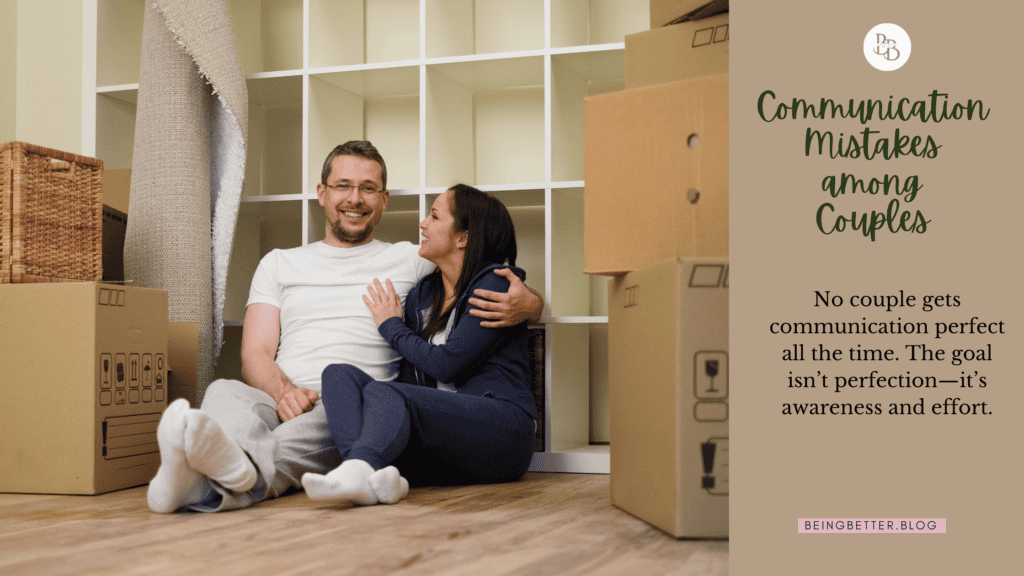Ever felt like you’re sharing the same space but not the same heart? Emotional intimacy is the secret glue that keeps love feeling warm, safe, and real — beyond the “I love yous” and shared routines. It’s about truly knowing each other, feeling seen, heard, and deeply connected.
From my childhood onwards, I was super clear on the kind of relationship I wanted in my life. I always wished for a true, meaningful relationship with strong emotional intimacy. I believed that having a partner who is emotionally connected to our soul can bring a lot of peace and happiness in our lives, along with making our lives much less complicated.
I found different methods to connect with my partner deeply, and yes, it’s an ongoing procedure of making each day better. I am happy to share those strategies here, wishing everybody reading this enjoys a beautiful and divine relationship with their partner. Let’s dive into it.

Table of Contents
1. Be Emotionally Available to Yourself First
Before building emotional intimacy with your partner, you need to start with yourself.
If you’re disconnected from your own feelings, you’ll struggle to share openly or understand what you really need in the relationship.
When you’re emotionally available to yourself, you’re no longer hiding behind “I’m fine” or burying your emotions just to keep the peace. Instead, you’re showing up as your full, honest self — and that’s the version your partner can truly connect with.
How to Be Emotionally Available to Yourself
🔹 Pause and check in with yourself.
Take a quiet moment and ask, “What am I feeling right now?” Not what you think you should feel — but what’s actually there.
🔹 Name the emotion.
Put a label on it: “I’m feeling anxious,” “I’m hurt,” “I’m lonely.” Naming your emotions makes it easier to understand and express.
🔹 Accept what comes up.
Don’t judge yourself for feeling “too sensitive” or “too emotional.” All feelings are valid.
🔹 Express it in a healthy way.
You can write it down, talk to someone you trust, or share it with your partner when you’re ready. The key is not bottling it up.
For me, keeping a daily journal is the best way to connect with myself. And when days pass, those old pages tell us how far we have come. I have written a detailed article on Journaling, which might be helpful for you as well.
2. Be Grateful for the Life You Share — Both of You
In the middle of everyday routines, stress, and little annoyances, it’s easy to forget just how precious this life — and this love — really is.
But the truth is… life is uncertain. Anything can change in a heartbeat. And that’s exactly why we need to pause and appreciate what we have, while we have it.
The quiet dinners, the shared laughs, the cozy silence, even the challenges you’ve overcome together — they all hold meaning.

Why Gratitude Deepens Intimacy
When both partners intentionally express gratitude — not just for life, but for each other — emotional intimacy grows stronger. You stop focusing on what’s lacking and start celebrating what’s real.
Gratitude shifts your perspective from “what’s missing” to “what’s beautiful.”
How to Practice This Together
Here are a few simple, meaningful ways to bring gratitude into your daily connection:
Say “Thank You” Often
Appreciate the little things your partner does – like making coffee, listening, or running errands.
Give Sincere Compliments
Acknowledge their strengths, character, and efforts with heartfelt words.
Write Gratitude Notes or Love Letters
Leave sticky notes or write short letters expressing what you love and appreciate about them.
Keep a Relationship Gratitude Journal
Write down one thing each day that you’re grateful for in your partner or your relationship.
Express Gratitude Out Loud
Take a moment during your day to say out loud what you’re grateful for – even small moments.
Recall Positive Memories Together
Reminisce about your favorite shared experiences to strengthen your bond.
Start or End the Day with “One Thing I Love About You”
Make it a small daily ritual to share something you admire or appreciate.
Celebrate Small Wins Together
Show appreciation when your partner reaches a goal, even a small one.
Cook or Do Something Special to Show Thanks
Actions speak louder than words – make their favorite meal or plan a small surprise.
Look for the Good in Tough Times
Even during conflict or stress, try to recognize and verbalize what you still appreciate.
Be Present and Truly Listen
Show gratitude by giving them your full attention – it’s a powerful way to honor their words and emotions.
Praise Them in Front of Others
Public appreciation (even in front of friends or family) makes your partner feel valued.
Make a “Reasons I’m Grateful for You” List
On a random day or special occasion, handwrite a list and give it to them.
Say “I Appreciate You” Instead of Just “I Love You”
These words offer a deeper emotional connection and acknowledgment.
Reflect Together Weekly
Once a week, sit together and share one thing you were grateful for in the relationship that week.
3. Listen to Understand, Not to Judge or Fix

One of the most powerful ways to build emotional intimacy? Truly listening.
Not half-listening while thinking of your reply.
Not jumping in to solve the problem.
Not judging what your partner feels.
Just listening — with the intention to understand.
In my relationship, I’ve always been the better listener, while my husband struggled with it. I often felt frustrated and let down when he would change the subject while I was still speaking. Thankfully, he was open to working on it, and things have started to get better with the help of some strategies we’ve been trying.
When someone feels genuinely heard, they feel loved, safe, and respected. And in any strong relationship, that kind of emotional safety is everything.
Why Not Judging or Fixing Matters
When your partner opens up and you instantly judge or offer solutions, it can feel like you’re dismissing their feelings — even if that’s not your intention.
They don’t always want advice.
They don’t need fixing.
They just want to be seen.
Judging can shut them down. Fixing can make them feel weak.
Understanding, though? That invites closeness.
How to Listen to Truly Understand
🔹 Be fully present.
Put away distractions. Look at them. Show them they have your full attention.
🔹 Focus on their feelings, not just the story.
Ask yourself: How are they feeling right now? What are they trying to express beneath the words?
🔹 Don’t interrupt.
Let them finish, even if you’re eager to respond. Sometimes, just letting someone talk it out brings them clarity and peace.
🔹 Reflect and validate.
Say things like:
- “That sounds really overwhelming.”
- “I can see why you’d feel that way.”
- “I hear you.”
🔹 Ask, “Do you want me to just listen, or are you looking for advice?”
This one’s a game-changer. It shows that you respect their needs in the moment.
4. Make Time for Just the Two of You — Every Day
No matter how busy life gets — with work, chores, or kids — your relationship still needs daily care. And one of the most powerful ways to keep emotional intimacy alive is by intentionally spending time together every single day.
It doesn’t have to be long or fancy. Sometimes it’s a deep talk, other times it’s just holding hands in silence. What matters is the connection — showing each other: I still see you. I still choose you.
Even five mindful minutes can make your bond feel stronger and more secure.
When couples stop checking in emotionally, they slowly drift apart — even while sharing the same roof.
But when you pause every day to connect, you:
- Feel more loved and supported
- Reduce misunderstandings
- Stay emotionally aligned as a team
These tiny moments of connection are like daily love deposits. And they add up beautifully over time.
How to Do It (Even with a Busy Schedule)
Here are some simple yet powerful ways to make time together daily:
🔹 Set a time for your mini-ritual.
Choose a pocket of time — maybe right after dinner, during your morning coffee, or before bed — and make it your moment.
🔹 Share one real emotion.
Ask, “How did you feel today?” Not “How was your day?”
Go deeper. Share something that moved you, even if it was small.
🔹 Touch with intention.
Hold hands. Hug slowly. Look into each other’s eyes for a few seconds. Smile. A soft forehead kiss. These little gestures say more than words ever could.
🔹 Keep screens away.
No phones. No distractions. Just you two — even if it’s just for 10 minutes.
🔹 Mix it up — short and sweet or deep and soulful.
Some days will be quick check-ins. Other days, you might have deep conversations. Let it flow naturally, without pressure.
Simple Tips to Follow:
- Light a candle and have tea together before bed
- Go for a short walk after dinner
- Sit on the couch and cuddle in silence
- Send a voice note during the day saying “I miss you”
- Gently touch your partner’s arm and say, “I’m glad I have you”
Connection doesn’t always require hours — just presence.
Show up for each other. Even in small ways. Especially on the busy days.
Because emotional intimacy isn’t built once — it’s built daily. 💞
5. Create Space for Difficult Conversations
Every relationship comes with moments of disagreement, hurt, or frustration. Whether it’s a misunderstanding, unmet expectation, or just one of those off days — what matters most is how you handle it.
Instead of brushing things under the rug, create a safe, respectful space to talk it out. Because emotional intimacy doesn’t just grow through happy moments — it deepens when you face challenges together.
Avoiding hard conversations might feel easier in the moment, but over time it creates emotional distance, resentment, and tension.
Facing issues calmly and kindly:
- Builds trust
- Clears emotional clutter
- Strengthens your bond
- Shows that your relationship is a safe space for honesty
It’s not about never arguing. It’s about learning how to navigate those tough moments as a team.

How to Create Space — Even When Life Is Busy
Especially with kids around, finding privacy to talk can feel tricky. But with a little intention, it’s absolutely possible.
🔹 Choose the right time and place.
Pick a quiet time when the kids are asleep, occupied, or out of earshot. Avoid starting heavy talks when either of you is hungry, exhausted, or rushed.
🔹 Stay on the same team.
Remind yourselves: It’s not me vs. you. It’s us vs. the problem. You’re not enemies — you’re partners trying to find peace.
🔹 Speak calmly and clearly.
Use “I feel…” statements instead of “You always…”
This prevents blame and helps the other person listen without defensiveness.
🔹 Listen without interrupting.
Let your partner finish before jumping in. Even if you disagree, just listen — it can soften even the hardest conversation.
🔹 Keep it private.
Avoid venting in front of the kids or dragging issues into public spaces. Kids pick up on tension, even when it’s unspoken.
🔹 Try to resolve it the same day.
Letting issues fester overnight can grow distance. Aim to talk, understand, and begin healing before going to bed, if possible.
A Few Gentle Tips
- Sit close when you talk — physical closeness can help emotional softness.
- If emotions run too high, take a 15-minute break — then return and finish calmly.
- End the talk with some kind of warmth — a hug, a kind word, or even just a gentle smile.
Difficult conversations, handled with care, can actually bring you closer.
When your relationship becomes a space where truth is welcomed and problems are faced together, emotional intimacy grows deeper and stronger.
6. Set General Rules for Everyday Life Together
(Think: Finances, Kids, Work, Routines & More)
Let’s face it — most relationship conflicts don’t come from big dramatic moments. They often stem from everyday decisions: money habits, parenting styles, chores, routines, or work-life balance.
That’s why having a few simple, agreed-upon “rules” or guidelines can make daily life smoother and more respectful — so you’re working with each other, not against.
Why It’s Important
- It reduces misunderstandings and repetitive arguments
- Creates structure and shared expectations
- Helps you make decisions as a team, not in conflict
- Strengthens trust, fairness, and emotional security
When both of you know what’s expected and what works for your lifestyle, everything flows better — and you save energy for love and connection instead of unnecessary stress.
Areas Where Rules Can Help
Here are some key areas where having shared rules or boundaries can keep your relationship strong:
🔹 Finances
- Budgeting together (monthly money check-in)
- Spending limits without discussion
- Saving goals and priorities
- How to handle shared expenses
🔹 Raising Kids
- Discipline approaches and screen time
- Routines like bedtime, meals, homework
- Boundaries around behavior and rewards
- Agreeing on what “consistency” means as parents
🔹 Work-Life Balance
- Rules around working late or bringing stress home
- Time blocks where work talk is off-limits
- Sharing responsibilities when one partner’s work gets intense
🔹 Household Tasks
- Divide chores based on skills or availability
- Take turns on certain tasks (like cooking or laundry)
- Use a visible calendar or planner to track who’s doing what
🔹 Digital Boundaries
- Phone-free meal times
- No arguing through texts
- Respecting personal device space or social media preferences
🔹 Quality Time
- Set a minimum time for intentional connection per day/week
- Prioritize couple time even during busy seasons
- Protect your “us” time from being overtaken by screens or others
How to Create and Follow These Rules
🔸 Sit down and talk honestly.
Make it a calm, loving conversation — not a strict rule-making session. Discuss where you feel stress or confusion and work together to come up with what makes sense.
🔸 Be flexible and fair.
You’re both growing and life shifts. Revisit your agreements regularly and adjust them as needed.
🔸 Write it down if needed.
A simple list or shared Google doc can help you both stay clear — especially for things like budgeting or weekly responsibilities.
🔸 Respect the “we” mindset.
It’s not about controlling each other — it’s about supporting each other with clarity and care.
🔸 Praise what’s working.
When one of you sticks to the plan or steps up, say thank you! Acknowledgment keeps the teamwork strong.
In our relationship, we both agreed to no phones at dinner, to switch bedtime duties every other night, and to check in about any purchase over $100 — it’s helped us avoid so many little arguments.”
You’re building a life together. A little structure doesn’t take away freedom — it adds peace.
Because when the basics are running smoothly, you both have more room to enjoy the love, laughter, and connection you truly want. 💑✨
7. Respect and Embrace Alone Time — For Both of You
Even in the most loving relationships, we’re still individuals — with our own thoughts, needs, and inner world. And that’s a beautiful thing.
Alone time isn’t a sign of distance or disinterest. In fact, it’s essential for emotional intimacy. Why? Because when both partners take time to recharge, reflect, and grow independently, they come back to the relationship more grounded, present, and emotionally available.
Why Alone Time Matters in a Relationship
- It helps you reconnect with yourself — your emotions, passions, and goals
- It prevents emotional burnout and resentment
- It gives space to miss and appreciate each other
- It supports a healthier, more balanced dynamic — where love is a choice, not a dependency
A healthy relationship is made up of two whole people — not two halves trying to complete each other.
How to Respect and Practice Alone Time
Here’s how to make it work beautifully in your relationship:
🔹 Communicate your need without guilt.
Say something like, “I just need a little time to clear my head or do something for myself — it helps me show up better for us.”
🔹 Don’t take it personally when your partner needs space.
Trust that it’s not about you — it’s about their self-care.
🔹 Set healthy boundaries for solo time.
It could be 30 minutes in the evening to journal, take a walk, read, or simply unwind alone — without interruption.
🔹 Support each other’s hobbies or quiet rituals.
Whether it’s painting, meditating, watching a show alone, or going for a solo coffee — cheer each other on. That’s love, too.
🔹 Reflect during your own alone time.
Use it to breathe, think, and reconnect with your emotions. The more in touch you are with yourself, the more deeply you can connect with your partner.
8. Have Healthy Boundaries — and Respect Them

Healthy boundaries are not walls — they’re bridges to better understanding, respect, and closeness.
In a loving relationship, it’s easy to assume that being close means being completely available 24/7 or saying yes to everything your partner wants. But true emotional intimacy actually thrives when both partners feel safe, respected, and honored as individuals — and that’s exactly what boundaries create.
What Are Healthy Boundaries, Really?
They’re clear understandings about:
- What’s okay and what’s not okay
- Personal space (emotional, physical, digital)
- Time, energy, and emotional needs
- Communication styles and conflict resolution
- How you want to be treated during stress, disagreement, or intimacy
They help define where you end and your partner begins — so each person feels seen and respected without being overwhelmed.
Why Boundaries Increase Emotional Intimacy
- You feel emotionally safe to be yourself
- There’s less resentment or emotional burnout
- Conflicts are handled with clarity, not confusion
- You love each other freely, not out of pressure
When both partners can express what they need — and actually feel heard — it builds deep trust. And trust is the foundation of emotional closeness.
Want to Learn More About Setting Healthy Boundaries?
Check out my detailed article 👉 Healthy Boundaries in Relationships
It’s packed with real-life examples, signs of weak boundaries, and simple ways to set and maintain them lovingly.
9. Build Emotional Safety Over Time
If emotional intimacy is the heart of a strong relationship, emotional safety is the heartbeat.
It’s the quiet confidence that says, “I can be myself with you — flaws, feelings, and all — and I won’t be judged or shut down.”
This kind of safety doesn’t happen overnight. It’s something you build, moment by moment, through how you talk, listen, respond, and show up for each other.
Why Emotional Safety Matters
Without emotional safety, partners hold back. They become cautious, defensive, or even emotionally distant.
But when it’s safe to be open — to express fears, dreams, hurts, or weird thoughts — your connection becomes deeper, more honest, and incredibly fulfilling.
You both feel:
- Seen and accepted
- Safe during disagreements
- Trusted and trusting
- Loved even on your “off” days
And that’s when true emotional intimacy really begins to bloom. 🌸
How to Build Emotional Safety — Together
Here are some practical, loving ways to create that safe emotional space in your relationship:
🔹 Be consistently kind — especially during conflict.
Anyone can be sweet when things are easy. But kindness in a tough moment? That builds deep emotional trust.
🔹 Let go of sarcasm, blame, and criticism.
Even “playful” sarcasm can feel like a jab when emotions are vulnerable. Be mindful of your tone. If something hurts, talk it out honestly.
🔹 Listen without judgment.
Let your partner express themselves fully — even if it’s messy or emotional. Instead of reacting, respond with calm and curiosity.
🔹Avoid using their past against them.
Nothing destroys safety like bringing up old wounds during a disagreement. Focus on the issue at hand — not past mistakes.
🔹 Be trustworthy — do what you say.
Even small promises matter. When your partner sees that you follow through, they feel more secure being open with you.
🔹 Celebrate progress, not perfection.
Emotional growth takes time. Cheer each other on for the small wins — honest conversations, vulnerable shares, or simply trying to do better.
🔹 Create a “no-shame” zone.
Let your partner know they can talk to you about anything — stress, guilt, fear, mistakes — and you’ll respond with love, not judgment.
Ideas to Practice Emotional Safety Daily
💬 Say, “I’m here for you no matter what.”
💗 Thank them for opening up, even if it was hard.
🕯️ Create cozy, relaxed spaces for deeper chats (like during evening walks or bedtime wind-downs).
🤝 Admit when you’re wrong — and make it okay for them to do the same.
✨ End hard conversations with warmth — a hug, a kind word, or a soft smile.
Emotional safety isn’t built through big grand gestures — it’s created in the small, everyday choices to be kind, patient, honest, and understanding.
When both partners feel safe enough to show up as their true selves, you don’t just build a strong relationship —
You build a beautifully safe space to grow, heal, love, and thrive together. 💞
Start small. Be present. Be honest. And above all, be loving.



